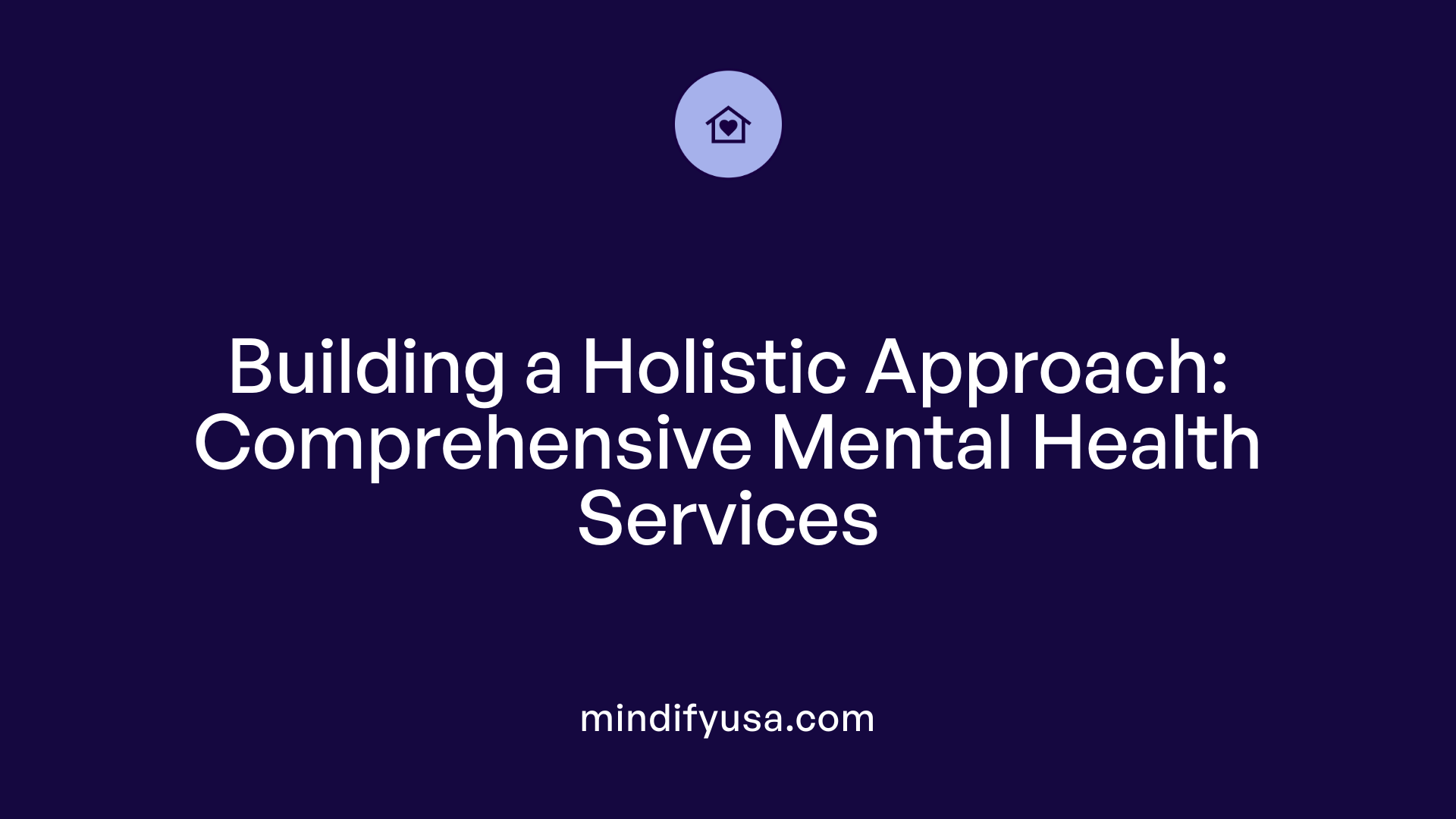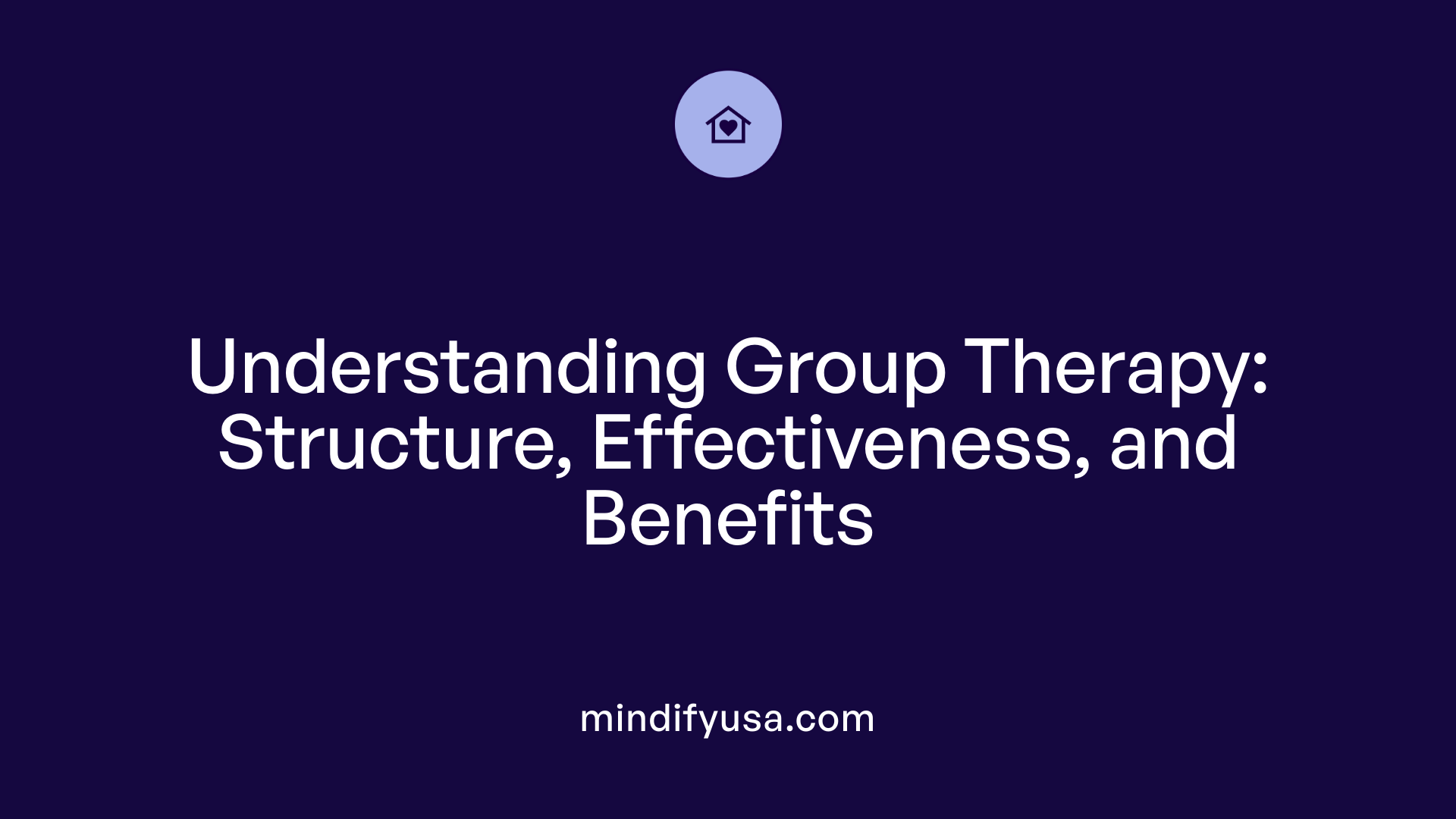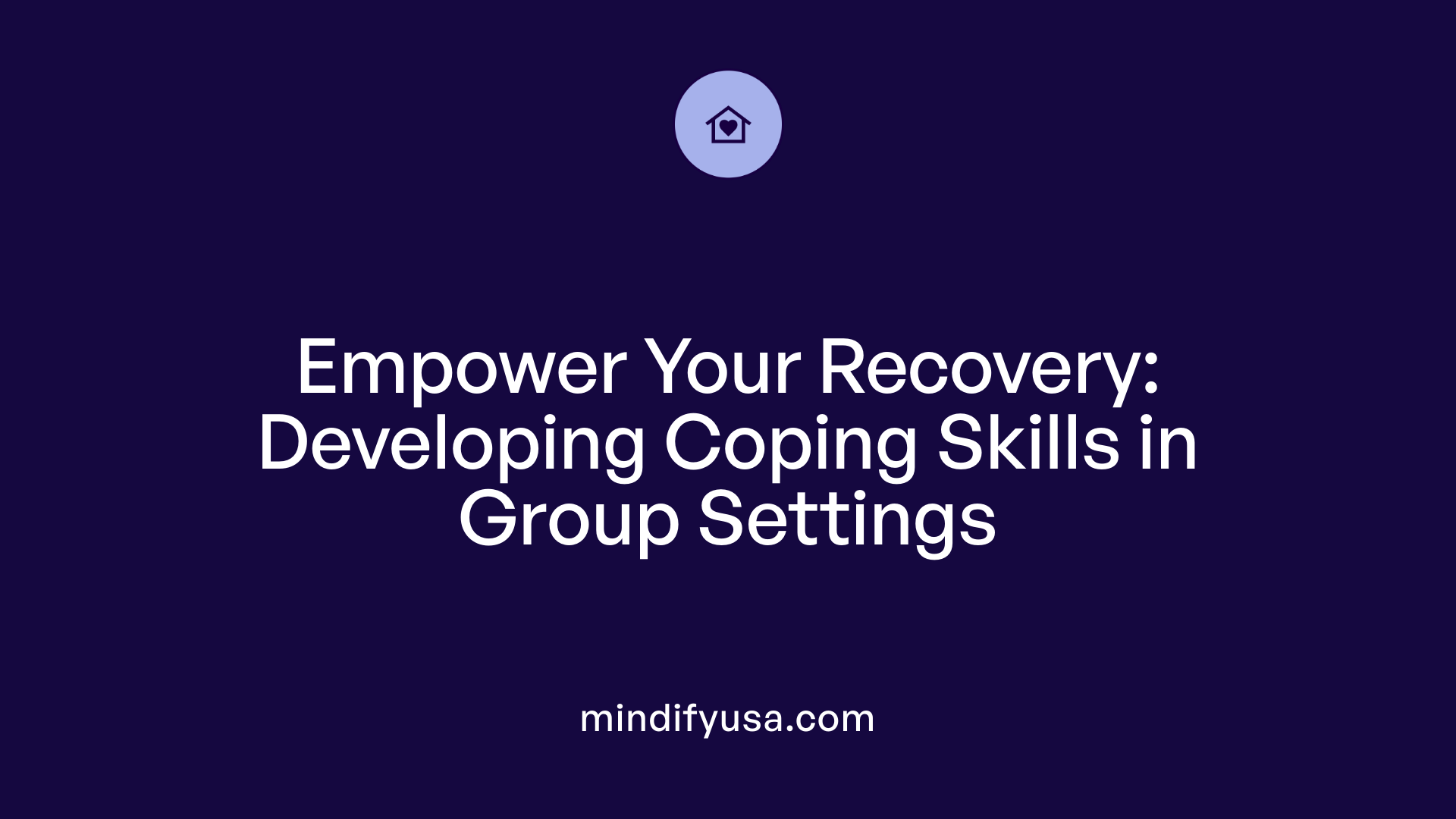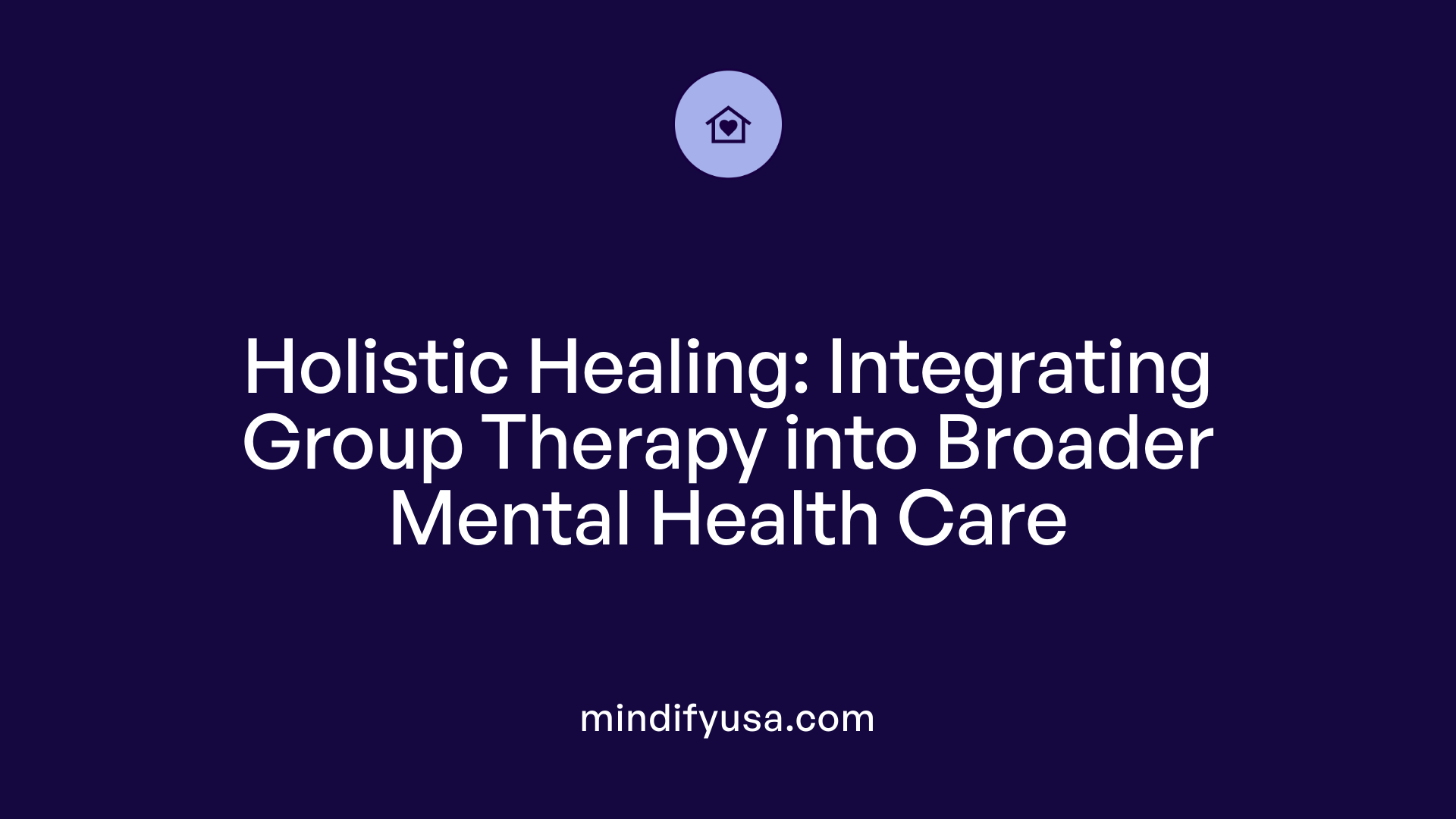Understanding the Role of Group Therapy in Comprehensive Mental Health Care
Group therapy has emerged as a vital component of comprehensive mental health services, offering adults a unique opportunity to build coping skills, foster personal growth, and connect with others facing similar challenges. This approach not only complements individual therapy but also provides a supportive community that can bolster resilience and reduce feelings of isolation. In light of increasing mental health needs, particularly for conditions such as anxiety and depression, exploring the benefits, types, and practical applications of group therapy is essential for both patients and healthcare providers.
The Foundation of Comprehensive Mental Health Programs

What types of mental health services should a comprehensive mental health program include?
A comprehensive mental health program incorporates a diverse array of services designed to meet the physical, emotional, social, and spiritual needs of individuals. Central to such programs is precise psychiatric evaluation for accurate diagnosis, which guides tailored treatment plans. Psychotherapy plays a critical role, involving various modalities such as individual, group, family, and couples therapy. Group therapy, for instance, provides benefits like shared experiences, skill development, and reduced feelings of isolation.
Medication management complements psychotherapy by addressing biochemical aspects of mental health disorders, helping to stabilize symptoms and enhance functioning. Holistic care approaches, including attention to nutrition, exercise, and lifestyle, also contribute significantly to overall wellness.
Why is holistic and community-based services important in mental health care?
Holistic and community-based services broaden access by integrating mental health care into general health settings and everyday environments. This integration reduces stigma and encourages early intervention. Campaigns like SAMHSA’s RecoverMe exemplify this effort by linking young adults with support for substance use and mental health challenges within their communities.
Such comprehensive programs emphasize the whole person rather than just symptom management, championing physical health, social connections, and emotional resilience. Education and advocacy initiatives raise public awareness, dismantle misconceptions, and empower individuals to seek help.
How do psychotherapy and medication management integrate within these programs?
Effective comprehensive programs blend psychotherapy and medication management. Psychotherapy provides tools for coping, emotional regulation, and insight, while medications may alleviate neurological imbalances that contribute to disorders. Group therapy is often combined with individual psychotherapy and pharmacotherapy, ensuring coordinated care among healthcare providers for optimal results.
What role does advocacy and education play?
Advocacy and education within comprehensive mental health programs help increase access, improve service quality, and reduce stigma. Organizations like SAMHSA lead public health efforts to promote mental health services and crisis intervention resources such as the 988 Suicide & Crisis Lifeline. By educating communities and influencing policy, these programs foster environments supportive of mental wellness and encourage individuals to engage in care without fear or shame.
Group Therapy Defined: Structure and Clinical Effectiveness

What Is Group Therapy and How Is It Structured?
Group therapy is a form of psychotherapy where one or two trained therapists work simultaneously with a small group of individuals facing similar mental health challenges. Typically, these groups consist of 5 to 12 members who meet weekly for 60 to 90 minutes. Groups may be open, allowing new members to join over time, or closed, where the same members participate throughout the therapy course. Confidentiality is a fundamental aspect, ensuring participants' privacy is respected.
How Effective Is Group Therapy Compared to Individual Therapy?
Research indicates that group therapy can be as effective as individual therapy for treating disorders such as anxiety, depression, trauma-related conditions, schizophrenia, and eating disorders. Group settings provide additional benefits including cost-effectiveness, increased access to care for underserved populations, and a supportive community environment that reduces feelings of isolation.
What Disorders Are Commonly Treated with Group Therapy?
Group therapy effectively addresses a wide range of mental health conditions including:
- Anxiety disorders
- Depression
- Post-traumatic stress disorder (PTSD)
- Personality disorders
- Substance use disorders
- Attention deficit hyperactivity disorder (ADHD)
- Obsessive-compulsive disorder (OCD)
Additionally, it is often integrated with other treatments such as individual psychotherapy and pharmacotherapy to optimize outcomes.
Why Is Professional Facilitation Important in Group Therapy?
Successful group therapy depends heavily on trained therapists who carefully select participants, compose the group with considerations for homogeneity or diversity, and structure sessions to promote trust, open dialogue, and mutual support. Professional facilitators ensure a safe environment that encourages personal growth, skill development, and therapeutic factors like cohesiveness, altruism, and catharsis, all of which contribute to the treatment's effectiveness.
Types of Group Therapy and Their Therapeutic Approaches
Various Group Therapy Modalities
Group therapy encompasses a broad range of modalities tailored to diverse mental health needs. Common types include Cognitive Behavioral Therapy (CBT), Dialectical Behavior Therapy (DBT), interpersonal process groups, psychodynamic groups, social systems groups, psychodrama, redecision therapy, and existential approaches. Each modality focuses on distinct principles and therapeutic goals.
Principles Behind CBT, DBT, Interpersonal, and Psychodynamic Groups
Cognitive Behavioral Therapy (CBT) in group settings targets identifying and reshaping negative thought patterns to alleviate symptoms, especially in anxiety and depression. It emphasizes developing practical coping skills such as reframing, relaxation techniques, and exposure therapy.
Dialectical Behavior Therapy (DBT) groups focus on emotional regulation, distress tolerance, mindfulness, and interpersonal effectiveness. These groups are especially effective for individuals experiencing emotional dysregulation and are often adjuncts to individual therapy.
Interpersonal Process Groups aim to cultivate insight and promote change through exploring relationship dynamics. These groups assist clients dealing with interpersonal difficulties, anxiety, and trust issues by using shared group experiences to foster growth.
Psychodynamic Group Therapy explores unconscious processes and early relational patterns influencing current functioning. This modality helps participants understand internal conflicts and deep-seated emotional experiences through interactions within the group.
Applications for Specific Mental Health Challenges
Different group therapy approaches are suited for varied conditions. For example, CBT and DBT groups effectively address anxiety, depression, trauma, and emotional dysregulation. Interpersonal groups assist those struggling with social anxiety and trust. Psychodynamic groups support clients coping with complex emotional histories and personality difficulties.
Additionally, specialized groups focus on issues like substance use, PTSD, personality disorders, ADHD, OCD, eating disorders, and chronic pain, providing targeted therapeutic interventions. Groups like Mindfulness-Based Cognitive Therapy (MBCT) and Acceptance and Commitment Therapy (ACT) also support emotional regulation and stress management.
Through these modalities, group therapy provides a structured, supportive environment promoting skill development, emotional growth, and connection among individuals sharing common struggles.
Therapeutic Factors Driving Success in Group Therapy
What are the essential therapeutic factors in group therapy?
Group therapy thrives on several therapeutic factors that enhance its effectiveness. Altruism, for example, allows participants to support each other, creating a powerful sense of giving and receiving help. Cohesiveness fosters a strong group bond, making members feel accepted and understood. Catharsis offers a safe outlet for emotional release, enabling participants to express and process difficult feelings openly. Corrective experiences occur when individuals encounter support that contrasts with negative past relationships, promoting healing and trust.
How does group therapy aid in social skill development and self-understanding?
Group settings provide a unique environment where members can practice and improve social skills such as communication, empathy, and conflict resolution. Through interactions and feedback, individuals gain deeper self-awareness, recognizing emotional patterns and behavioral tendencies. This reflective process encourages personal growth and emotional regulation, vital for managing conditions like anxiety and depression.
What roles do hope and motivation play in group therapy?
Hope is a cornerstone of group therapy, as sharing stories of recovery and resilience inspires participants to envision their own progress. The supportive atmosphere increases motivation, helping individuals stay committed to their therapeutic goals. Accountability within the group further encourages consistency, while the collective energy fosters optimism and a sustained drive toward healing.
These therapeutic factors combine to create a potent framework for personal transformation, offering both emotional support and practical tools essential for mental health recovery.
Building Coping Skills Through Group Therapy

What Skills Are Taught in Group Therapy Settings?
Group therapy provides a platform to learn and practice vital coping skills that help manage mental health challenges like anxiety and depression. Commonly taught skills include emotional regulation, where participants learn to recognize and control intense emotions, and communication skills that improve interpersonal interactions. Mindfulness techniques are also integral, helping individuals stay present and reduce stress.
How Does Feedback and Practice Function Within Group Therapy?
Feedback within the group setting is immediate and constructive, allowing members to reflect on their behaviors and thoughts. This process enhances self-awareness and personal growth. Practicing new strategies in a safe, supportive environment encourages participants to experiment with coping mechanisms, with therapists guiding and adjusting approaches tailored to individual needs.
How Does Group Therapy Develop Resilience and Motivation?
Group therapy fosters a sense of belonging and mutual support, reducing feelings of isolation common in mental health struggles. The accountability and encouragement from peers in the group enhance motivation to maintain progress. As participants share experiences and witness others overcome obstacles, hope is nurtured, fueling resilience and a proactive mindset toward recovery.
Through this dynamic and interactive approach, group therapy not only equips individuals with practical coping skills but also cultivates emotional strength and sustained motivation, essential for managing anxiety, depression, and related conditions effectively.
The Social and Emotional Benefits of Group Therapy

How does group therapy foster a sense of belonging and support?
Group therapy creates a unique environment where individuals with similar struggles can connect and share experiences. This connection fosters a deep sense of belonging, helping participants feel understood and supported. It reduces feelings of isolation often associated with mental health challenges, providing a safe space to express oneself and receive validation.
How does group therapy help reduce isolation and stigma?
Participants in group therapy often find relief in realizing they are not alone in their struggles. Sharing openly with others helps diminish stigma by normalizing mental health challenges. The judgment-free atmosphere encourages honest dialogue, which reduces shame and fosters acceptance both within and outside the group.
What role does peer learning and multiple perspectives play in group therapy?
Hearing diverse viewpoints from peers enriches the therapeutic experience. Participants gain insights from others’ coping strategies and life experiences, which can inspire new ways to manage their own challenges. This collective wisdom promotes creativity in problem-solving and enhances overall learning.
How does group therapy enhance empathy and interpersonal skills?
Group settings offer opportunities to practice social skills like communication, empathy, and conflict resolution. Through interactions and feedback, members develop better understanding of others’ feelings and perspectives. This emotional growth fosters improved relationships both within the group and in participants’ broader social circles.
Accessibility and Affordability of Group Therapy
How does group therapy compare in cost to individual therapy?
Group therapy is often more affordable than individual therapy because one or two therapists work with multiple clients simultaneously. This shared approach reduces the cost per participant, making mental health support accessible for more people.
In what ways does group therapy increase access for underserved populations?
By lowering costs and increasing availability through group formats, therapy becomes accessible to underserved groups who may face financial or geographic barriers. Additionally, online group programs facilitate participation for those in remote areas or with limited mobility.
How is group therapy integrated with other treatments?
Group therapy is frequently combined with pharmacotherapy and individual psychotherapy to provide comprehensive care. Coordinated treatment plans ensure patients benefit from multiple modalities, improving outcomes in managing mental health conditions such as anxiety and depression.
This combination of affordability, accessibility, and integration with other treatments makes group therapy a valuable resource for expanding mental health services across diverse populations.
Specialized Group Therapy Programs for Adult Mental Health
What Are CBT and DBT Groups?
Cognitive Behavioral Therapy (CBT) groups focus on identifying and reshaping negative thought patterns, making them particularly effective for treating anxiety and depression. These groups teach coping strategies such as reframing, relaxation techniques, and exposure exercises.
Dialectical Behavior Therapy (DBT) groups are designed to help individuals regulate intense emotions and reduce self-destructive behaviors, especially useful for emotional dysregulation. DBT groups teach mindfulness, emotion regulation, distress tolerance, and interpersonal effectiveness skills. Participants typically engage in DBT groups alongside individual therapy.
How Do ACT and Mindfulness-Based Cognitive Therapy Work?
Acceptance and Commitment Therapy (ACT) groups help participants develop psychological flexibility through mindfulness and values-based action. Mindfulness-Based Cognitive Therapy (MBCT) combines cognitive therapy with mindfulness practices, aiming to reduce relapse of depression by fostering greater awareness and emotional regulation. Both therapies emphasize present-moment awareness and acceptance as central techniques.
What Specialized Groups Address PTSD, Substance Use, and Relationship Issues?
Specialized group programs target issues such as post-traumatic stress disorder (PTSD), substance use challenges, and relationship difficulties. These groups provide tailored interventions that focus on trauma processing, relapse prevention, and communication skills. For relationship issues, groups may include couples therapy and support for nontraditional relationship arrangements.
What Tailored Groups Exist for Life-Stage Challenges?
Group therapy also addresses specific life-stage challenges, offering focused programs for areas such as pregnancy, mid-life transitions, fertility concerns, burnout, grief, ADHD, and chronic skin conditions. These tailored groups provide supportive environments where members share experiences unique to their life stage and learn coping skills relevant to their circumstances.
Specialized group therapy programs enhance emotional regulation, interpersonal skills, and resilience, offering adults a comprehensive support system suited to diverse mental health and life challenges.
Ensuring Effective Group Therapy: Patient Selection and Group Composition
What criteria determine appropriate patient selection for group therapy?
Selecting the right participants is crucial for the success of group therapy. Patients should have similar struggles or goals, such as managing anxiety or depression, to foster mutual understanding and relevance. It's also important that participants are willing and able to engage openly and respectfully within a group setting. Consideration of co-occurring conditions and readiness for therapy ensure safety and appropriateness.
How do homogeneity and heterogeneity affect group composition?
Groups benefit from a balance between homogeneity and heterogeneity. Homogeneity, or shared characteristics among members, creates a sense of safety and common ground, enabling participants to relate closely to each other's experiences. Conversely, heterogeneity brings diverse perspectives and coping strategies, enriching the group dynamic with new insights. Thoughtful group composition blends these elements to maximize therapeutic outcomes.
What is the role of structured facilitation and confidentiality in group therapy?
Effective group therapy relies on trained professionals who facilitate sessions with clear structure and goals. Facilitators guide discussions, manage group dynamics, and ensure respectful interaction, fostering trust and engagement. Confidentiality is a cornerstone, with all members expected to respect each other's privacy. This secure environment encourages openness, reducing stigma and promoting personal growth.
In summary, optimal group therapy blends careful patient selection, thoughtful group makeup, and expert facilitation within a confidential setting to create an environment conducive to healing and growth.
Integrating Group Therapy Within Holistic Mental Health Care

How Does Group Therapy Combine With Individual and Family Therapies?
Group therapy is often used alongside individual psychotherapy and family counseling to create a comprehensive mental health care approach. This integration allows for addressing both personal introspection in private sessions and shared experiences in group settings. Combining these therapies helps build a supportive network, improves communication skills across relationships, and encourages consistent coping mechanisms. For example, Dialectical Behavior Therapy (DBT) groups frequently complement individual therapy to teach skills such as mindfulness and emotion regulation, while family therapy addresses relational dynamics.
What Supportive Programs and Crisis Services Are Available?
Organizations like SAMHSA and Epic Health Partners offer a spectrum of supportive programs, including outpatient therapy, partial hospitalization, and crisis intervention services. SAMHSA’s crisis helplines, such as the 988 Suicide & Crisis Lifeline, provide immediate mental health emergency support. Recovery campaigns and specialized groups target substance use and co-occurring disorders, emphasizing community-based care. These programs collectively reinforce ongoing mental health maintenance and crisis support within a holistic framework.
How Are Telehealth and Online Group Therapy Options Used?
The rise of telehealth has expanded access to mental health services, including group therapy. NYU Langone and other providers use secure, HIPAA-compliant platforms to run over 30 different group therapy programs for adults. Telehealth options allow for flexible scheduling and accommodate individuals with busy lifestyles or geographic limitations. Online groups maintain confidentiality while fostering community and provide specialized support for conditions such as anxiety, PTSD, and chronic pain.
By integrating group therapy with individual and family treatments, supported by crisis and telehealth services, mental health care becomes more accessible, personalized, and effective in addressing diverse patient needs.
Positive Psychology and Emerging Trends in Group Therapy
How is positive psychology applied in group therapy?
Recent advancements in group therapy incorporate principles of positive psychology to enhance treatment outcomes. This approach fosters psychological virtues such as humanity, wisdom, transcendence, courage, temperance, and justice. Group therapy sessions encourage participants to develop these attributes, which serve both as process guides and measurable outcomes.
What role do attachment theory and mentalization play in group therapy?
Attachment theory and mentalization frameworks are increasingly integrated into group therapy to improve interpersonal understanding and secure attachments. By fostering a safe environment for sharing and relational interactions, these theories help participants regulate emotions, build trust, and improve perspective-taking abilities within the group setting.
How does group therapy promote resilience, hope, forgiveness, and accountability?
Group therapy cultivates resilience by creating a sense of belonging and universality, which counters feelings of shame and stigma. The incorporation of positive psychology promotes virtues such as hope and forgiveness, strengthening members' capacity to recover from setbacks. Furthermore, themes of humility and accountability emerge naturally through group dynamics, supporting personal growth and meaningful recovery.
In summary, integrating positive psychology and relational frameworks into group therapy sessions offers a holistic approach that advances emotional well-being, nurtures interpersonal skills, and fosters virtues essential for long-term psychological health and flourishing.
Long-Term Impact and Post-Treatment Support from Group Therapy
Continued Practice of Coping Strategies
Group therapy equips participants with practical coping mechanisms such as emotional regulation, mindfulness, and communication skills. These techniques are essential for managing ongoing mental health challenges like anxiety and depression. The therapy environment encourages the application of these skills in daily life, fostering resilience and adaptive behavior long after the sessions end.
Maintenance Groups and Community Supports
To reinforce progress, many programs offer maintenance groups, such as CBT graduate groups, which provide opportunities to practice skills, troubleshoot challenges, and maintain accountability. Community support networks and continued therapy options further enhance recovery by creating sustained connections and encouragement, ensuring individuals stay motivated and engaged in their mental health journey.
Relationships Beyond Therapy Sessions
One of the invaluable aspects of group therapy is the formation of supportive relationships that often extend beyond formal meetings. These connections create ongoing sources of motivation, empathy, and belonging, helping to prevent feelings of isolation that can contribute to relapse. The shared experiences and mutual understanding within the group foster durable bonds that support sustained recovery.
Promoting Recovery and Reduced Relapse
Group therapy fosters a hopeful and resilient mindset by emphasizing recovery as a process and interpreting setbacks as opportunities for growth. The safe, nonjudgmental group environment promotes accountability and encourages members to commit to their goals. Together with continued practice and community supports, group therapy significantly reduces relapse risks and supports long-term mental wellness.
Real-World Successes: Testimonials and Evidence-Based Practices
Client Experiences and Effectiveness Rates
Many individuals who participate in group therapy report significant positive changes within just six months. Over 75% of clients experience improvements, highlighting the therapy's efficacy in reducing symptoms of anxiety, depression, and related disorders. Testimonials from participants often emphasize the value of feeling less isolated, gaining motivation, and developing coping skills in a supportive setting.
Role of Evidence-Based Practices like CBT in Groups
Cognitive Behavioral Therapy (CBT) is one of the most widely used evidence-based approaches in group settings. It helps participants identify and reshape negative thought patterns, leading to better emotional regulation and symptom relief. Research supports CBT’s effectiveness against anxiety, depression, and trauma when applied in groups, enabling clients to learn coping mechanisms, receive real-time feedback, and practice new strategies with peers.
Importance of Professional, Compassionate Care
The success of group therapy strongly depends on skilled facilitators who provide a professional, compassionate environment. Careful group selection, confidentiality, and structured sessions foster trust and safety. Compassionate therapists guide discussions, ensuring each member’s voice is heard and supported. This personalized care enhances engagement and helps clients build resilience, trust, and self-understanding, all crucial for long-term mental health recovery.
The Transformative Potential of Group Therapy in Adult Mental Health
Group therapy stands out as a powerful, evidence-based approach within comprehensive mental health care, uniquely equipping adults with practical coping skills, emotional resilience, and a supportive community. By addressing a broad spectrum of mental health challenges—including anxiety, depression, trauma, and substance use—group therapy fosters healing through shared experience, skill-building, and mutual encouragement. Its affordability and accessibility further expand mental health support options. As ongoing research integrates positive psychology principles, group therapy continues to evolve, promoting not only symptom relief but also profound personal growth and psychological flourishing. Embracing group therapy within holistic treatment frameworks can significantly enhance mental health outcomes and quality of life for adults worldwide.
References
- Home | SAMHSA - Substance Abuse and Mental Health ...
- Group Therapy - StatPearls
- The Benefits of Group Therapy: Why It Works
- Group Psychotherapy
- Why Group Therapy For Mental Health Could Change Your ...
- Discover the Benefits of Therapy for Mental Health
- New horizons in group psychotherapy research and ...





































































































